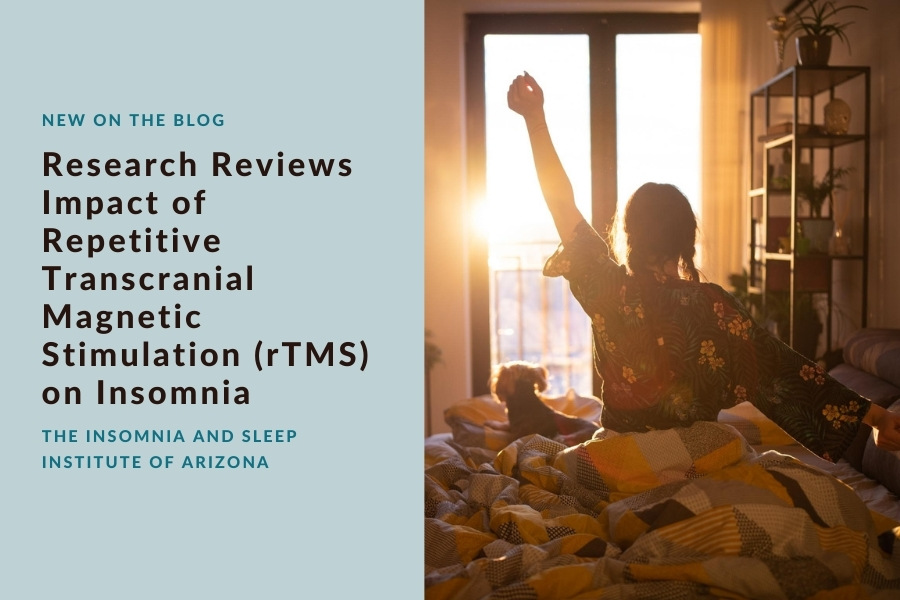The neuromodulator technique called repetitive transcranial magnetic stimulation, or rTMS, is FDA-approved to treat major depressive disorder. However, it has recently gained traction as a potential treatment for sleep disorders like insomnia, too. That’s why The Insomnia and Sleep Institute of Arizona offers rTMS as well as a suite of other services and treatments. We are home to unparalleled staffing levels and are led by triple board-certified Dr. Ruchir P. Patel, who has been voted “Top Doc” in the region by his peers for six consecutive years. We proudly set the standard in sleep medicine in Arizona and are strictly staffed by sleep specialists concentrating in sleep medicine.
When you or your child is struggling with a sleep disorder, you need a correct diagnosis and the right treatment quickly. How exactly does rTMS work for sleep disorders? A recent study published in Sleep Science and Practice explores how the treatment—typically reserved for psychological conditions like depression, anxiety, and PTSD—works in the field of sleep medicine. The authors analyzed a number of trials that consider rTMS for insomnia, hyperinsomnia, and restless legs syndrome (RLS). They noted that, “It is unknown whether rTMS has intrinsically beneficial properties when applied to primary sleep disorders, or if it only acts on sleep through mood disorders.” Although current literature in this area is scarce and there are not many randomized clinical trials on rTMS and insomnia, there are some reports that show “subjective sleep improvement” and “objective improvement” in the outcome.
How rTMS Works
rTMS is a relatively new treatment. It is completely non-invasive and creates magnetic fields, and in turn electrical currents, that depolarize neurons while modulating their activity in the cortical regions of the brain. It is designed to be used repetitively, thus rTMS, and has been FDA approved since 2018 for obsessive compulsive disorder treatment. According to the report, rTMS has an “excellent tolerability profile” with the most common side effects being temporary scalp discomfort, headaches, and muscle twitching in the face. Those with history of seizures or with a pacemaker are not good candidates for rTMS, while cochlear implants or other metallic materials in the head are absolute contraindications for the treatment.
The researchers noted that sleep disorders are common, and that many studies have reported rTMS has improved sleep quality conditions in subjective measures. This was shown to be true even in those who showed no improvement in any related mood disorders. They noted that neuroimaging studies revealed those with chronic primary insomnia typically have cortical hyperexcitability, marking it with a key pathophysiologic feature that is different than those with other sleep disorders. Overall, lack of sleep in otherwise healthy people has also been linked to an increase in cortical excitability. rTMS treatments have consistently been shown to regulate cortical states in those with major depressive disorder, leading the authors to suggest that rTMS “could benefit patients with sleep pathologies such as insomnia, obstructive sleep apnea, and restless leg syndrome which have been shown to have altered cortical features.” They also stress that rTMS has shown in studies to positively influence sleep by, for example, minimizing the results of sleep deprivation on memory and ramping up slow-wave activity.
Is rTMS for You?
The only way to find the right treatment for you and your sleep disorder(s) is via a consultation with a sleep expert. There is no need for a referral to schedule a consultation at The Insomnia and Sleep Institute. rTMS may be helpful in getting you the sleep that you need, but sometimes a combination of treatments and therapies is best. If you or your child are suffering with any kind of sleep problems, help is available. We work with children as young as two years old, as sleep is especially critical for developing bodies and brains.
rTMS is just one potential treatment for some of the most common sleep disorders. The authors of the research concluded that “rTMS is a fast-evolving field and holds great potential as a treatment for various neurological and mental disorders … our review suggests potential applications of rTMS in insomnia, as well as in other sleep disorders in the future.” Get ahead of the curve and schedule your consultation with The Insomnia and Sleep Institute today. Call the office or, for the fastest response, complete the online form now.





